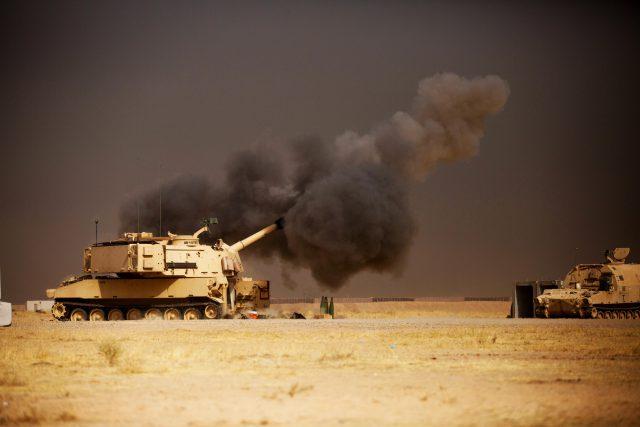The battle for Mosul and a splintering Middle East
Posted By William Gourlay on October 28, 2016 @ 11:00

The long-anticipated battle to wrest Mosul [1] from the so-called Islamic State of Iraq and Syria (ISIS) is underway. Sitting on an ethnic fault line between Turkish, Kurdish and Arab spheres, the city affords a prism through which to view the geopolitical problems that beset the Middle East.
In the opening salvoes of a campaign that is expected to be long and hard fought, there have been some early successes [2]. Kurdish Peshmerga forces have made rapid gains [3] on the outskirts of Mosul, while the Nineveh Protection Units, an Iraqi Christian militia operating alongside the Peshmerga, are securing territory [4] and have restored crosses to churches in villages liberated from the jihadis.
The Peshmerga and the Christian militia are just two groups fighting as part of an umbrella force arrayed against ISIS that includes the Iraqi army and the mostly Shiite Popular Mobilisation Units. While the US and Europe are providing air cover for the offensive, the US military is at pains to point out that all of the combat forces [5] are Iraqi nationals.
This show of unity must be a good thing in a country that has been riven by ethnic and sectarian divisions. Iraq isn’t alone in this predicament. It’s well understood that ISIS first emerged [6] out of a deeply fractured political landscape where sectarian discrimination and marginalisation are commonplace. So creating a coalition of forces to retake Mosul may go some way to healing those fractures.
But don’t put those rose-coloured glasses on too quickly. Problems arise when considering that each of the different elements of the multi-ethnic, multi-confessional force approaching the ISIS stronghold harbours different agendas and ambitions. Shiites, Sunnis, Kurds and Christians may be united in their desire to oust ISIS, but beyond that they have little in common. Mosul, the second biggest city in Iraq, is something of a prize, and one for which there are multiple competing claims.
The picture is further complicated by Turkish President Recep Tayyip Erdoğan’s loud insistence [7] on Turkey’s right to be included in the coalition to take Mosul and to take a seat at the negotiating table once the campaign is over. Erdoğan has also recently revived the spectre of the National Pact [8], an intra-Turkish agreement dating to the 1920s in which Turkey envisioned itself retaining control of Mosul, as well as Aleppo, much of Iraqi Kurdistan and Armenia, and parts of the Balkans. This sabre-rattling posture has raised the ire of Iraqi Prime Minister Haider al-Abadi and has unsettled Washington.
The prospect of a greater Turkey plays well to Turkish ultranationalists, who now make up a part of Erdoğan’s constituency, but it also highlights anew the controversies that linger over the drawing of borders [9] in the region.
The rise of ISIS and its ‘caliphate’ had already called into question the existing state system in the Middle East; now that the group’s grip on territory is slipping it appears that regional players are jostling to best position themselves for the aftermath. The fact that Erdoğan’s evocation of the National Pact resonates at all, even with a maverick audience, is a measure of the state of play. Regional actors believe, or perhaps recognise, that everything on that ethnic fault line—borders, cities, territory—is in flux.
Turkey has a track record of opportunistic expansion [10], but Ankara’s not alone in taking advantage of prevailing geopolitical circumstances to claim territory and assert influence. In the wake of the ouster of Saddam Hussein, Iran is seen to have gradually extended its reach [11] in the Arab world. More recently, the Iraqi Kurds seized Kirkuk, a city they have long coveted, and the Syrian Kurds, under the banner of the Syrian Democratic Forces, have extended control over much of northern Syria as ISIS has been pushed back.
These actions may all appear aggressive or expansionist, but they should be examined in light of the strategic landscape. In an arena where actors profoundly distrust their neighbours, and fear their neighbours’ regional ambitions, claiming territory is also a defensive measure. Land is a means to legitimacy and strength, but it also affords security in a hostile environment.
In today’s Middle East, communication between actors is fraught, there’s little faith in the regional order, and sabre-rattling and nationalist rhetoric are widespread. The imperative has been to seek advantages over rivals and to circumvent threats, real or perceived. That means that until channels of communication are opened, we’re likely to see a lot more jockeying for territory and the persistent risk of a widening conflagration [12].
Policy makers would do well to remember that the ousting of ISIS from Mosul is an important step, but that finding a lasting peace will require effort and ingenuity that addresses deep political and diplomatic cleavages, in Iraq and across the region.
Article printed from The Strategist: https://aspistrategist.ru
URL to article: /battle-mosul-splintering-middle-east/
URLs in this post:
[1] Mosul: http://www.reuters.com/article/us-mideast-crisis-iraq-mosul-insight-idUSKCN12N0QL
[2] early successes: http://www.reuters.com/article/us-mideast-crisis-iraq-mosul-idUSKCN12P1KT
[3] rapid gains: http://www.reuters.com/article/us-mideast-cris-iraq-mosul-idUSKCN12N0CA
[4] territory: http://www.france24.com/fr/20161023-video-ville-irak-bartella-liberee-retour-communaute-chretienne-reportage-mossoul
[5] combat forces: http://www.inherentresolve.mil/News/Article/975205/iraqi-security-forces-begin-battle-for-mosul/
[6] ISIS first emerged: https://theconversation.com/even-if-mosul-is-liberated-it-wont-be-the-end-of-islamic-state-66959
[7] loud insistence: http://www.sabah.com.tr/gundem/2016/10/18/cumhurbaskani-erdogan-musul-tartismasinda-son-noktayi-koydu
[8] National Pact: http://www.aljazeera.com.tr/haber/erdogan-eger-misak-i-milli-diye-bir-derdimiz-varsa
[9] drawing of borders: http://www.bbc.com/news/world-middle-east-36300224
[10] opportunistic expansion: http://foreignpolicy.com/2016/10/23/turkeys-religious-nationalists-want-ottoman-borders-iraq-erdogan/
[11] extended its reach: http://www.reuters.com/article/us-mideast-iran-region-insight-idUSKBN0MJ1G520150323
[12] widening conflagration: https://www.alaraby.co.uk/english/Comment/2016/10/19/The-spectre-of-tomorrow-After-the-battle-for-Mosul
Click here to print.